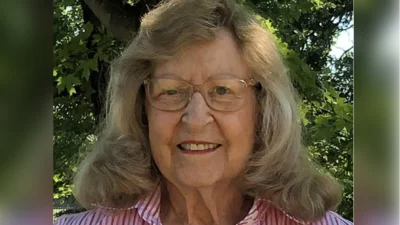State Senator Celina Villanueva | Illinois General Assembly
State Senator Celina Villanueva | Illinois General Assembly
According to the Illinois General Assembly site, the legislature summarized the bill's official text as follows: "Amends the Environmental Protection Act. Requires the Environmental Protection Agency to annually review and update the underlying data for, and use of, indicators used to determine whether a community is designated as an environmental justice community and to establish a process by which communities not designated as environmental justice communities may petition for such a designation. Provides that an applicant for a permit for the construction of a new source that will become a major source subject to the Clean Air Act Permit Program to be located in an environmental justice community or a new source that has or will require a federally enforceable State operating permit and that will be located in an environmental justice community must conduct a public meeting prior to submission of the permit application and must submit with the permit application an environmental justice assessment identifying the potential environmental and health impacts to the area associated with the proposed project. Provides requirements for the environmental justice assessment. Contains provisions regarding public participation requirements for permitting transactions in an environmental justice community. Provides that, if the Agency grants a permit to construct, modify, or operate a facility that emits air pollutants and is classified as a minor source, a third party may petition the Pollution Control Board for a hearing to contest the issuance of the permit. Contains provisions regarding environmental justice grievances. Defines terms. Contains other provisions."
The following is our breakdown, based on the actual bill text, and may include interpretation to clarify its provisions.
In essence, this bill amends the Environmental Protection Act to require the Illinois Environmental Protection Agency (IEPA) to annually review and update data and indicators for designating environmental justice communities and establish a petition process for such designations. It mandates permit applicants for new major sources or those requiring federally enforceable State operating permits in these communities to conduct public meetings and submit an environmental justice assessment detailing potential environmental and health impacts. Provisions are included for public participation in permitting within these communities and allow third-party petitions to contest issued permits. Definitions for key terms like "cumulative impact," "disproportionate harm," and "environmental justice community" are included. The bill also outlines requirements for environmental justice assessments, grievance processes for alleged Civil Rights Act violations, and public participation requirements for permitting in environmental justice communities. It goes into effect on its passing by the General Assembly.
Celina Villanueva has proposed another two bills since the beginning of the 104th session.
Villanueva graduated from the University of Illinois at Urbana-Champaign in 2008 with a BA.
Celina Villanueva is currently serving in the Illinois State Senate, representing the state's 12th Senate District. She replaced previous state senator Steven Landek in 2023.
Bills in Illinois follow a multi-step legislative process, beginning with introduction in either the House or Senate, followed by committee review, floor debates, and votes in both chambers before reaching the governor for approval or veto. The General Assembly operates on a biennial schedule, and while typically thousands of bills are introduced each session, only a fraction successfully pass through the process to become law.
You can read more about bills and other measures here.
| Bill Number | Date Introduced | Short Description |
|---|---|---|
| SB1307 | 01/28/2025 | Amends the Environmental Protection Act. Requires the Environmental Protection Agency to annually review and update the underlying data for, and use of, indicators used to determine whether a community is designated as an environmental justice community and to establish a process by which communities not designated as environmental justice communities may petition for such a designation. Provides that an applicant for a permit for the construction of a new source that will become a major source subject to the Clean Air Act Permit Program to be located in an environmental justice community or a new source that has or will require a federally enforceable State operating permit and that will be located in an environmental justice community must conduct a public meeting prior to submission of the permit application and must submit with the permit application an environmental justice assessment identifying the potential environmental and health impacts to the area associated with the proposed project. Provides requirements for the environmental justice assessment. Contains provisions regarding public participation requirements for permitting transactions in an environmental justice community. Provides that, if the Agency grants a permit to construct, modify, or operate a facility that emits air pollutants and is classified as a minor source, a third party may petition the Pollution Control Board for a hearing to contest the issuance of the permit. Contains provisions regarding environmental justice grievances. Defines terms. Contains other provisions. |
| SB0120 | 01/17/2025 | Amends the Illinois Act on the Aging. In provisions concerning the Community Care Program, provides that, subject to federal approval, on and after January 1, 2026, rates for in-home services shall be increased to $32.75 to sustain a minimum wage of $20 per hour for direct service workers. As a condition of their eligibility for the $32.75 in-home services rate, requires in-home services providers to (i) certify to the Department on Aging that they remain in compliance with the mandated wage increase for direct service workers and (ii) submit cost reports. Provides that fringe benefits shall not be reduced in relation to the rate increases. Provides that beginning January 1, 2028, the Department shall ensure that each in-home service provider spends a minimum of 80% of total payments the provider receives for homecare aide services it furnishes under the Community Care Program on total compensation for direct service workers who furnish those services. Requires the Department to adopt rules on financial reporting and minimum direct service worker costs. Authorizes the Department to sanction a provider that fails to meet the requirements of the amendatory Act. Defines terms. |
| SB0144 | 01/17/2025 | Amends the School Code. Prohibits a charter from being granted to an organization that operates a private, parochial, or non-public school or child care facility. Provides that a charter school shall spend no less than 90% of its budget on direct-service costs for students. Removes provisions regarding the closure of charter schools, the use of unspent public funds, and the procedures for disposition of property and assets. Requires the governing body of a charter school that is the subject of a school action to work collaboratively with local school educators and families of students attending the charter school to ensure successful integration of affected students into new learning environments. Requires, for a charter school closure, the governing body of the charter school to ensure that all students of the charter school at the time of the closure will be guaranteed a seat at a receiving school and that all teachers of the charter school at the time of the closure will be guaranteed a job at a receiving school. Sets forth requirements for school transition plans. Requires the governing body of the charter school to designate at least 3 opportunities for public comment at a hearing or meeting on the proposed school action. |






 Alerts Sign-up
Alerts Sign-up